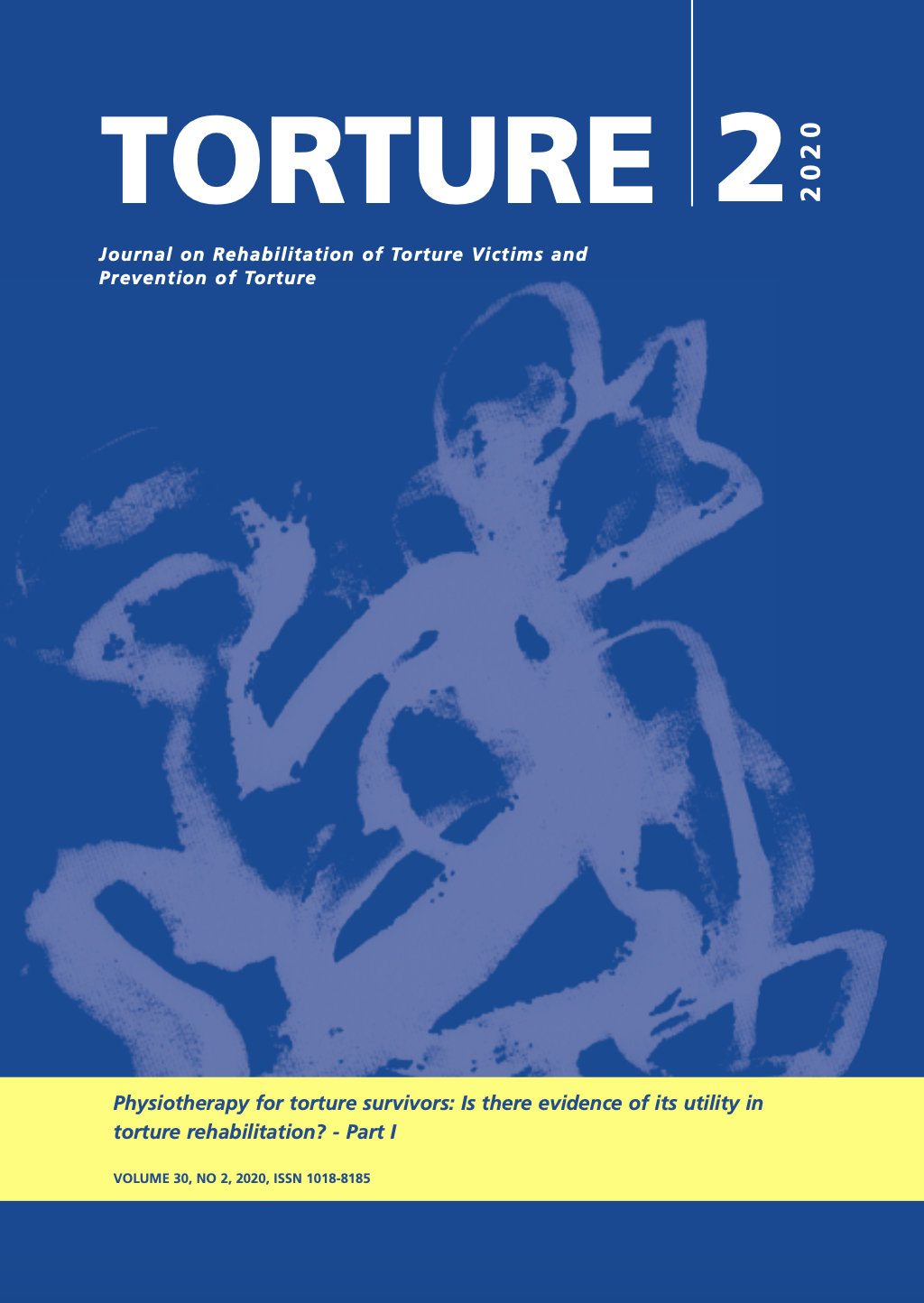Ethical criteria when a (potential) perpetrator asks a human rights organization to defend their case based on the forensic documentation of alleged torture. How shall we proceed?
Debate
DOI:
https://doi.org/10.7146/torture.v30i2.119718Keywords:
Medical Ethics, Torture, Perpetrators, Istanbul ProtocolAbstract
Objective
Discuss the ethical dilemma of perpetrators requesting clinical evaluations intended to prove persecution or torture. The discussion is organized around three real cases.
Method
We present three cases of plausible perpetra- tors, partially amended to protect anonymity. The paper presents a review of the complex ethical challenges that the dilemma poses.
A multidisciplinary panel of doctors, psychologists and lawyers had a similar discussion and agreed on three criteria presented here for contrast with the broader community of researchers and practitioners. The paper is not in itself a legal or ethical academic review, instead, it establishes the main terms of debate, demonstrates the lack of literature that debates it and reflects an initial consensus between forensic workers in an independent human rights organization.
References
Adshead, G., & Sarkar, S. P. (2020). Ethical Issues in Clinical Forensic Psychiatry. In A. Igoumenou (Ed.). Psychiatry, 6. https://doi.org/10.1007/978-3-030-37301-6
Brim, O. G. (1965). Privacy and Behavioural Research. Columbia Law Review, 7, 1184 – 1211.
Canadian Psychological Association. (2017). Canadian Code of Ethics for Psychologists (4th ed.). Canadian Psychological Association. https://cpa.ca/docs/File/Ethics/CPA_Code_2017_4thEd.pdf
Candilis, P. J. (2009). The Revolution in Forensic Ethics: Narrative, Compassion, and A Robust Professionalism. Psychiatric Clinics of North America, 32(2), 423–435. https://doi.org/10.1016/j.psc.2009.02.005
Consejo General de Colegios Oficiales de Psicólogos. (2010). Código Deontológico, Madrid. https://www.cop.es/pdf/Codigo-Deontologico-Consejo-Adaptacion-Ley-Omnibus.pdf
Consejo General de Colegios Oficiales de Médicos. (2011). Código de Deontología Médica. Madrid. https://www.cgcom.es/sites/default/files/codigo_deontologia_medica.pdf
Ford, E., & Rotter, M. (2014). Landmark Cases in Forensic Psychiatry. Oxford University Press. https://doi.org/10.1201/b13499-98
Goethals, K. (2018). Forensic Psychiatry and Psychology in Europe: A Cross-border Study Guide. Springer International Publishing. https://doi.org/10.1093/med/9780199393435.003.0019
Government of Rwanda v. Nteziryayo, Brown, Munyaneza, Mutabaruka & Ugirashebuja, [2017] EWHC 1912 (Admin). (2017). https://www.judiciary.uk/wp-content/uploads/2017/07/rwanda-v-nteziryayo-and-others-judgment-20170728.pdf
International Rehabilitation Council for Torture Victims. (2012). Forensic Examination Missions by Medical Teams Investigating and Documenting Alleged Cases of Torture: Operational Manual. International Rehabilitation Council for Torture Victims. https://irct.org/assets/uploads/pdf_20161120160850.pdf
Kalmbach, K. C., & Lyons, P. M. (2006). Ethical Issues in Conducting Forensic Evaluations. Applied Psychology in Criminal Justice, 2(3), 261–290.
Le Monde. (2011, 28 September). La Demande d’extradition d’Agathe Habyarimana Rejetee. Le Monde. https://www.lemonde.fr/afrique/ article/2011/09/28/la-demande-d-extradition-d-agathehabyarimanarejetee_1579081_3212.html
Mason, T. (2006). Forensic Psychiatry: Influences of Evil. Humana Press.
Niveau, G., & Welle, I. (2018). Forensic Psychiatry, One Subspecialty with Two Ethics? A Systematic Review. BMC Medical Ethics, 19(1), 1–10. https://doi.org/10.1186/s12910-018-0266-5
OHCHR (1991) Principles for the Protection of Persons with Mental Illness and the Improvement of Mental Health Care, United Nations General Assembly Resolution 46/119. https://www.who.int/mental_health/policy/en/UN_Resolution_on_protection_of_persons_with_ mental_illness.pdf
Radio France Internationale. (2014, 26 February). Top French Court Blocks Extraditionof Rwandan Genocide Suspects. Radio France Internationale. https://www.rfi.fr/en/africa/20140226-top-french-court-rules-against-extradition-three-rwandan-genocide-suspects
Swanepoel, M. (2010). Ethical Decision-Making in Forensic Psychology. Koers, 75(4), 851–872.
Tarasoff v. Regents of University of California, 17 Cal.3D 425. (1976). https://scocal.stanford.edu/opinion/tarasoff-v-regents-university-california-30278
UN General Assembly, Convention Against Torture and Other Cruel, Inhuman or Degrading Treatment or Punishment, 10 December 1984, United Nations, Treaty Series, vol. 1465, p.85, available at: https://www.refworld.org/docid/3ae6b3a94.html
UN General Assembly, Convention Relating to the Status of Refugees, 28 July 1951, United Nations, Treaty Series, vol. 189, p. 137, available at: https://www.refworld.org/docid/3be01b964.html
World Psychiatric Association. (1996). Madrid Declaration on Ethical Standards for Psychiatric Practice. https://www.ochrance.cz/fileadmin/user_upload/ochrana_osob/Umluvy/zdravotnictvi/Madrid_declaration_on_ethical_standards.pdf
Yadav, P. K. (2017). Ethical Issues Across Different Fields of Forensic Science. Egyptian Journal of Forensic Sciences, 7(1), 1–6. https://doi.org/10.1186/s41935-017-0010-1
Downloads
Published
How to Cite
Issue
Section
License
We accept that some authors (e.g. government employees in some countries) are unable to transfer copyright. The Creative Commons Licence Attribution-NonCommercial-NoDerivatives 4.0 International (CC BY-NC-ND 4.0) covers both the Torture Journal and the IRCT web site. The publisher will not put any limitation on the personal freedom of the author to use material contained in the paper in other works which may be published, provided that acknowledgement is made to the original place of publication.


